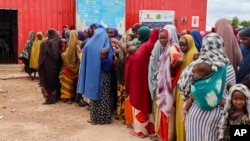Donors raised around a billion dollars Wednesday in new commitments for the drought-stricken Horn of Africa during a pledging conference held at the United Nations, but failed to close the gap on an appeal seeking $7 billion.
“We must act now to prevent crisis from turning into catastrophe,” U.N. Secretary-General Antonio Guterres told donors. “Make no mistake: action will make all the difference.”
The U.N. says $7 billion is needed this year to assist nearly 32 million people in Ethiopia, Kenya and Somalia who are facing acute food insecurity after five failed rainy seasons have caused unprecedented drought. With the year nearly half over, Guterres said they have received just 20% of the funds.
“Without an immediate and major injection of funding, emergency operations will grind to a halt and people will die,” he told donors.
With Wednesday's commitments and the money the U.N. has already received this year, it brings the total to around $2.4 billion for the Horn.
Enormous needs
The U.N. children’s agency, UNICEF, says more than 7 million children under the age of five are malnourished and in need of nutritional therapy. Nearly 2 million could die from severe malnutrition.
Across the Horn, crops have failed and more than 13 million livestock have died, wiping out both livelihoods and food sources. Conflict in parts of Ethiopia and Somalia have further exacerbated food insecurity.
Last year, a famine was averted in Somalia after increased international funding, led by the United States, helped scale up humanitarian assistance. But the country still suffered severely, with the U.N. estimating that 43,000 people died, most likely due to the drought. This year, difficulties continue, as the World Food Program had to reduce food assistance to 3 million Somalis last month due to severe funding shortfalls. Without a cash injection, the agency says it will have to make more cuts in July.
U.N. deputy humanitarian chief Joyce Msuya told the conference that although famine was averted in Somalia, the humanitarian emergency is not over.
“This year, while improved rains have started to ease the impacts of drought, they have brought a new set of risks and challenges, including disease outbreaks,” she said.
U.S. envoy Linda Thomas-Greenfield announced an additional $524 million to address humanitarian needs in the Horn, bringing Washington’s assistance to more than $1.4 billion through the end of September 2023.
“In a world abundant with food, entire communities should never starve to death. Never,” she said.
Germany announced $226 million for this year and next; Britain pledged $178 million for East Africa, of which $120 million will target the drought-affected countries in the Horn. But many countries did not step forward with new or expanded pledges.
Aid organizations disappointed
International aid organizations expressed disappointment, pointing out that many pledges were not new.
“This was a vital moment for rich donors to step up and show their commitment to saving lives,” said Fati N’Zi-Hassane, Oxfam’s Africa director. “They have failed millions of people caught up in this vicious spiral of hunger, displacement, and insecurity.”
“People will continue to die from hunger and malnutrition if they are not supported with long-term and scaled-up investments that address immediate needs while contributing to resilience and climate adaptation,” said Allison Huggins, deputy director for Africa for Mercy Corps.
“The truth is that the data, the early warning systems and some of the solutions are clear, but the political and financial commitment has so far been far too weak,” David Miliband, president of the International Rescue Committee, told the meeting.
Wednesday’s conference was co-hosted by the United Nations, with the governments of Britain, Italy, Qatar and the United States, in collaboration with Ethiopia, Kenya, and Somalia.




